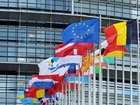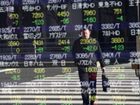European stock markets lost more than 3.0 percent on Monday owing to fears that the new coronavirus could seriously disrupt economic activity worldwide.
In London, the FTSE index closed 3.3 percent lower, in Paris stocks were off by 3.9 percent, Frankfurt's main index was down by 4.0 percent and Milan saw a plunge of 5.4 percent.
 Full Story
Full Story
EU ambassadors on Monday finalized a mandate for chief negotiator Michel Barnier ahead of tough talks due to start next week on Britain's future relationship with the bloc.
 Full Story
Full Story
Finance ministers and central bank governors from G20 nations meet in the Saudi capital Saturday for a two-day gathering to discuss the global economy and the risks from the coronavirus epidemic.
 Full Story
Full Story
A spike in new virus cases outside China spooked Asian markets Friday after Wall Street pulled back from record highs as more companies warned earnings could be hurt by the epidemic.
 Full Story
Full Story
Lebanon’s SGBL bank on Thursday denied as “totally baseless” media reports claiming that politicians and shareholders had made transfers through the bank to foreign financial institutions in the wake of the October 17 uprising.
 Full Story
Full Story
U.S. investment bank Morgan Stanley announced Thursday it will acquire the brokerage E*Trade in a deal valued at $13 billion.
 Full Story
Full Story
Argentina's debt is not sustainable, the IMF concluded Wednesday at the end of a week-long visit, urging the government to generate funds from private investors to address the issue.
 Full Story
Full Story
French investigators said Wednesday they were stepping up their investigation into two parties thrown by fallen auto titan Carlos Ghosn at the Palace of Versailles, including his lavish 2016 wedding.
The prosecutor's office in the Paris suburb of Nanterre, which had been leading the probe, said it had been handed to an investigating magistrate, which means that Ghosn -- who jumped bail in Japan in December -- could soon face charges in France.
 Full Story
Full Story
World stock markets mostly rebounded Wednesday on investor hopes that the deadly coronavirus will have only a short-term impact on corporate earnings and economic growth.
 Full Story
Full Story
British annual inflation surged to 1.8 percent in January from 1.3 percent one month earlier, official data showed Wednesday, boosting the pound.
 Full Story
Full Story



